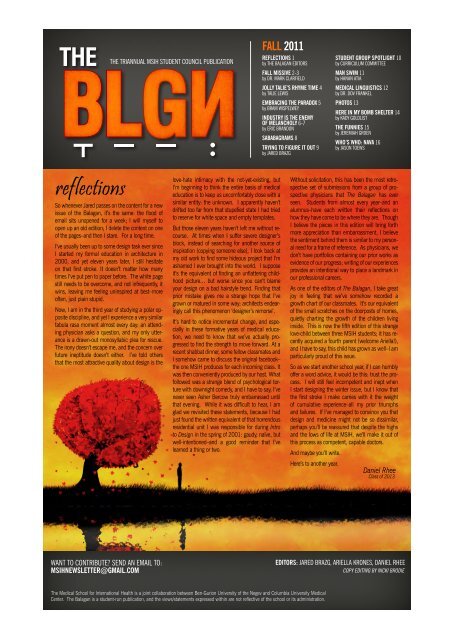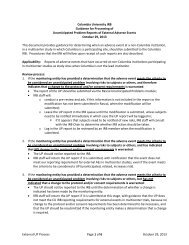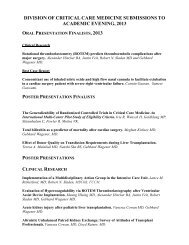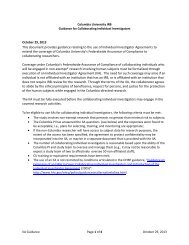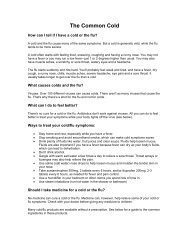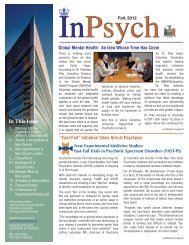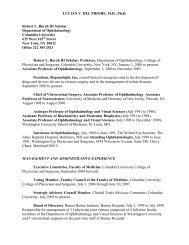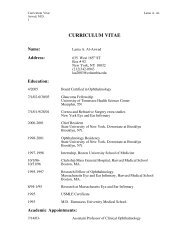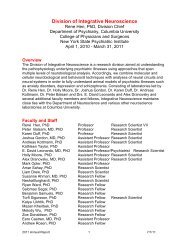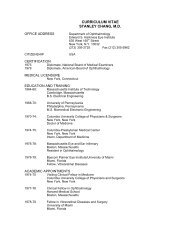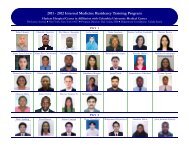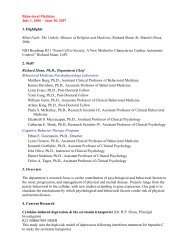FALL2011 - Columbia University Medical Center
FALL2011 - Columbia University Medical Center
FALL2011 - Columbia University Medical Center
You also want an ePaper? Increase the reach of your titles
YUMPU automatically turns print PDFs into web optimized ePapers that Google loves.
eflections<br />
So whenever Jared passes on the content for a new<br />
issue of the Balagan, it’s the same: the flood of<br />
email sits unopened for a week; I will myself to<br />
open up an old edition; I delete the content on one<br />
of the pages–and then I stare. For a long time.<br />
I’ve usually been up to some design task ever since<br />
I started my formal education in architecture in<br />
2000, and yet eleven years later, I still hesitate<br />
on that first stroke. It doesn’t matter how many<br />
times I’ve put pen to paper before. The white page<br />
still needs to be overcome, and not infrequently, it<br />
wins, leaving me feeling uninspired at best–more<br />
often, just plain stupid.<br />
Now, I am in the third year of studying a polar opposite<br />
discipline, and yet I experience a very similar<br />
tabula rasa moment almost every day: an attending<br />
physician asks a question, and my only utterance<br />
is a drawn-out monosyllabic plea for rescue.<br />
The irony doesn’t escape me, and the concern over<br />
future ineptitude doesn’t either. I’ve told others<br />
that the most attractive quality about design is the<br />
WANT TO CONTRIBUTE? SEND AN EMAIL TO:<br />
MSIHNEWSLETTER@GMAIL.COM<br />
THE TRIANNUAL MSIH STUDENT COUNCIL PUBLICATION<br />
FALL 2011<br />
REFLECTIONS 1<br />
by THE BALAGAN EDITORS<br />
FALL MISSIVE 2-3<br />
by DR. MARK CLARFIELD<br />
JOLLY TALIE’S RHYME TIME 4<br />
by TALIE LEWIS<br />
EMBRACING THE PARADOX 5<br />
by BRAM WISPELWEY<br />
INDUSTRY IS THE ENEMY<br />
OF MELANCHOLY 6-7<br />
by ERIC BRANDON<br />
SABABAGRAMS 8<br />
love-hate intimacy with the not-yet-existing, but<br />
I’m beginning to think the entire basis of medical<br />
education is to keep us uncomfortably close with a<br />
similar entity: the unknown. I apparently haven’t<br />
drifted too far from that stupefied state I had tried<br />
to reserve for white space and empty templates.<br />
But those eleven years haven’t left me without recourse.<br />
At times when I suffer severe designer’s<br />
block, instead of searching for another source of<br />
inspiration (copying someone else), I look back at<br />
my old work to find some hideous project that I’m<br />
ashamed I ever brought into the world. I suppose<br />
it’s the equivalent of finding an unflattering childhood<br />
picture… but worse since you can’t blame<br />
your design on a bad hairstyle trend. Finding that<br />
prior mistake gives me a strange hope that I’ve<br />
grown or matured in some way; architects endearingly<br />
call this phenomenon ‘designer’s remorse’.<br />
It’s hard to notice incremental change, and especially<br />
in these formative years of medical education,<br />
we need to know that we’ve actually progressed<br />
to find the strength to move forward. At a<br />
recent shabbat dinner, some fellow classmates and<br />
I somehow came to discuss the original facebook–<br />
the one MSIH produces for each incoming class. It<br />
was then conveniently produced by our host. What<br />
followed was a strange blend of psychological torture<br />
with downright comedy, and I have to say, I’ve<br />
never seen Asher Bercow truly embarrassed until<br />
that evening. While it was difficult to hear, I am<br />
glad we revisited these statements, because I had<br />
just found the written equivalent of that horrendous<br />
residential unit I was responsible for during Intro<br />
to Design in the spring of 2001: gaudy, naïve, but<br />
well-intentioned–and a good reminder that I’ve<br />
learned a thing or two.<br />
TRYING TO FIGURE IT OUT 9<br />
by JARED BRAZG<br />
The <strong>Medical</strong> School for International Health is a joint collaboration between Ben-Gurion <strong>University</strong> of the Negev and <strong>Columbia</strong> <strong>University</strong> <strong>Medical</strong><br />
<strong>Center</strong>. The Balagan is a student-run publication, and the views/statements expressed within are not reflective of the school or its administration.<br />
STUDENT GROUP SPOTLIGHT 10<br />
by CURRICULUM COMMITTEE<br />
MAN SWIM 11<br />
by HANAN ATIA<br />
MEDICAL LINGUISTICS 12<br />
by DR. DOV FRANKEL<br />
PHOTOS 13<br />
HERE IN MY BOMB SHELTER 14<br />
by KADY GOLDLIST<br />
THE FUNNIES 15<br />
by JEREMIAH GROEN<br />
WHO’S WHO: NAVA 16<br />
by JASON TOEWS<br />
Without solicitation, this has been the most retrospective<br />
set of submissions from a group of prospective<br />
physicians that The Balagan has ever<br />
seen. Students from almost every year–and an<br />
alumnus–have each written their reflections on<br />
how they have come to be where they are. Though<br />
I believe the pieces in this edition will bring forth<br />
more appreciation than embarrassment, I believe<br />
the sentiment behind them is similar to my personal<br />
need for a frame of reference. As physicians, we<br />
don’t have portfolios containing our prior works as<br />
evidence of our progress; writing of our experiences<br />
provides an intentional way to place a landmark in<br />
our professional careers.<br />
As one of the editors of The Balagan, I take great<br />
joy in feeling that we’ve somehow recorded a<br />
growth chart of our classmates. It’s our equivalent<br />
of the small scratches on the doorposts of homes,<br />
quietly charting the growth of the children living<br />
inside. This is now the fifth edition of this strange<br />
love-child between three MSIH students; it has recently<br />
acquired a fourth parent (welcome Ariella!),<br />
and I have to say, this child has grown as well–I am<br />
particularly proud of this issue.<br />
So as we start another school year, if I can humbly<br />
offer a word advice, it would be this: trust the process.<br />
I will still feel incompetent and inept when<br />
I start designing the winter issue, but I know that<br />
the first stroke I make carries with it the weight<br />
of cumulative experience–all my prior triumphs<br />
and failures. If I’ve managed to convince you that<br />
design and medicine might not be so dissimilar,<br />
perhaps you’ll be reassured that despite the highs<br />
and the lows of life at MSIH, we’ll make it out of<br />
this process as competent, capable doctors.<br />
And maybe you’ll write.<br />
Here’s to another year.<br />
Daniel Rhee<br />
Class of 2013<br />
EDITORS: JARED BRAZG, ARIELLA KRONES, DANIEL RHEE<br />
COPY EDITING BY NICKI BRODIE
AN UPDATE ON MSIH FROM DR. CLARFIELD<br />
THE BALAGAN<br />
GREETINGS<br />
It is once again my pleasure,<br />
at your editors’ request, to provide<br />
the BLGN with a (slightly belated) New<br />
Year’s missive. I especially want to express my<br />
gratitude to the editors of this fine publication for the time and effort<br />
they have put in to ensure that it comes out. Many thanks to Jared<br />
Brazg and Daniel Rhee.<br />
Of course I first want to welcome our incoming students and I do<br />
hope that they are quickly settling in. As I mentioned at their recent<br />
Physician’s Oath ceremony, I am full of admiration for the members<br />
of this class for all of the usual reasons, plus the fact that despite a<br />
(too) exciting intro to our neighbourhood, you have all decided to stay<br />
here with us. As we say in Hebrew, “kol hakavod“, or in English,<br />
“more power to you”!<br />
Over the next couple of months, usually together with Dr. Alan Jotkowitz,<br />
I will be meeting with each of the first year class to get to<br />
know you better as well as for you to make our acquaintance. One<br />
very positive aspect of our small school, which I very much value and<br />
encourage, is the “short distance” between students and faculty.<br />
Returning to the above-mentioned ceremony, not only did I enjoy our<br />
speaker Prof. Basil (Boaz) Porter’s inspiring and entertaining remarks,<br />
I really loved the skits, movies and songs put on afterwards by the<br />
students. I haven’t laughed so hard in a long time. Keep it coming.<br />
THE GOOD<br />
(news)<br />
With respect to our longstanding<br />
collaboration with <strong>Columbia</strong> <strong>University</strong>,<br />
we were privileged within the first month of<br />
the school year to have a visit from my co-director<br />
Dr. Richard Deckelbaum, as well as from Dr. Lynne Quittell, the<br />
head of our admissions committee. As always, we benefited from<br />
their presence, advice and fine teaching. We look forward to their<br />
speedy return.<br />
Over the last year we have made a number of curricular changes<br />
and are working on others. Some of these modifications resulted<br />
from consultations with students primarily, but not exclusively, via<br />
the Curriculum committee (chair, Dr. Alan Jotkowitz) and Global<br />
Health Group (chair, Dr. Tzvi Dwolatzky) as well as from the feedback<br />
surveys (see below on this delicate subject).<br />
Regarding the curriculum we have added new course coordinators<br />
for immunology, pharmacology, medical anthropology and clinical<br />
days. I think we have all seen tangible evidence of the improvements<br />
made and thanks go to the students who took the initiative to work<br />
on the curriculum committee. In addition, we are continuing our<br />
visiting professors program. Dr. Lynne Quittell has recently visited,<br />
and will likely return to contribute to our paeds clerkship. We are<br />
currently enjoying the presence of Dr. Ken Prager from <strong>Columbia</strong>,<br />
and Dr. Steve Sharf of the <strong>University</strong> of Maryland will teach in the<br />
2<br />
FALL 2011
AN UPDATE ON MSIH FROM DR. CLARFIELD<br />
THE BALAGAN<br />
respiratory system and internal medicine clerkship. Dr. Adi Haramati<br />
from Georgetown <strong>University</strong> will also be arriving to teach physiology.<br />
And from north of the 49th parallel, Dr. Michael Gordon of the<br />
<strong>University</strong> of Toronto will contribute his expertise in both geriatrics<br />
and medical ethics; Dr. Howard Bergman from McGill <strong>University</strong><br />
will visit as well.<br />
In keeping with our goal of maintaining high academic standards,<br />
while at the same time helping students who might be having some<br />
trouble with their studies, faculty will be meeting earlier and more<br />
frequently with those who might find themselves struggling. While<br />
this initiative will be coming from faculty, we of course encourage<br />
any student who feels the need for help not to hesitate to ask for it<br />
at anytime. As well, as do many schools in the US, we are carefully<br />
considering offering (for free) a USMLE voluntary refresher course,<br />
which would take place over a few days towards the end of 2nd<br />
year. For those interested, we will be giving you tentative dates as<br />
soon as possible so you can make travel plans accordingly. Details<br />
to follow.<br />
With respect to resources, even in these difficult economic times,<br />
we have managed once again to find extra resources to encourage<br />
and aid students at different levels. For example, we just met<br />
to discuss the applications of those who applied for a need-based<br />
scholarship. As we did last year, the associate director of students<br />
affairs, Dr. Asher Moser, will carefully consider all applications and<br />
will divide up the funding available as fairly and equitably as possible.<br />
Announcements about these grants will be made shortly.<br />
Returning once again to student support, while we have helped the<br />
Student Council activities with funding from time to time over the<br />
past years, this year I wish to announce that a budget of 10,000 NIS<br />
will be made available to the council for appropriate activities. (For<br />
technical reasons, requests for this funding will have to go through<br />
our offices, and must always follow <strong>University</strong> guidelines as to what<br />
we are allowed to support). That being said, we think that in this<br />
way the student body can plan and budget their activities early on<br />
and provide the school administration with a budget plan for the<br />
upcoming year. I want to take this opportunity to thank Talie Lewis<br />
and her able crew for their work on Council. We very much value<br />
your contributions.<br />
As I think we have made clear over the years, MSIH is also very<br />
supportive of the idea of students attending and presenting at relevant<br />
conferences–both in Israel and abroad. To this end, we have<br />
also found resources to encourage such activities. This year we have<br />
raised another $5,000 for such support: $3,000 for attendance<br />
at AMSA meetings and another $2,000 to send students to the<br />
upcoming GHEC meeting in Montréal. Of course it must also be<br />
clear that we can only allow students who are in good academic<br />
standing to miss classes and attend such meetings. Criteria will<br />
be drawn up and shared with you in the coming months so that<br />
members of the student body will know how to access these funds.<br />
THE BAD<br />
(a cloud on the horizon…)<br />
As mentioned in an earlier email, there continues to be a dispute<br />
between BGU and Kupat Holim Clalit (which<br />
owns Soroka Hospital) about payment for<br />
teaching rendered by Soroka doctors<br />
to the <strong>University</strong>. This problem<br />
involves the whole Faculty of<br />
Health Sciences (both He-<br />
brew language medical school and MSIH). This is a recurring event<br />
that has been resolved each year without seriously affecting teaching.<br />
We do believe the issue will be resolved again this year, but<br />
there is a slight chance that teaching may be disrupted for a short<br />
time. We are making contingency plans just in case. Just today I<br />
learned that this problem has been solved, at least for this year and I<br />
expect a more permanent solution to be worked out for future years.<br />
THE UNNECESSARY<br />
(as in, should be….)<br />
For those saintly MSIH students who religiously read all messages<br />
from the school, and respond–both frankly and with alacrity, and<br />
those who thoughtfully fill in every one of Liora’s surveys, you can<br />
skip this section. For the 99% of you others, please read on...<br />
With respect to feedback surveys, unfortunately despite reminders,<br />
the overall response rate continues to be quite low. This poor showing<br />
puts an unnecessary obstacle in front of the school’s attempts to<br />
gather feedback, digest it and act upon it. I once again appeal to your<br />
own enlightened sense of self interest. Being the evidence-based kind<br />
of folks I know you all aspire to be, it should not be necessary to<br />
point out that biased results which emanate from poor response<br />
rates may actually be worse for the process of ongoing improvement<br />
than no results at all. So once again, please take pen in hand (or<br />
more accurately, phalanges to keyboard) and take a moment to<br />
help us help you.<br />
With respect to emails, I also want to appeal to you all once again<br />
to read the messages from the school and respond expeditiously. As<br />
well, allow me to remind you that those of you who forward your<br />
bgumail to another system (gmail, hotmail, etc) will miss some<br />
important missives. We really have no other way to get in touch with<br />
you. While I know how many of these irritating little messages we all<br />
have to cope with each day, and I am sympathetic to complaints that<br />
we are all inundated all the time, we do appreciate your cooperation<br />
in this domain.<br />
IN CLOSING<br />
I am, like you, very distressed that some of our less-friendly neighbours<br />
from Gaza have just recently decided to lob missiles our way<br />
once again. I know that many of you find this very disturbing. We<br />
will of course do whatever is in our power to keep you safe in your<br />
studies, and provide you with as much guidance and support as possible.<br />
We’ll get through this difficult period–together.<br />
On a happier note, again, I want to thank the editors of the BLGN<br />
for inviting me to address you through its colourful and stimulating<br />
pages. Please allow me to wish our Jewish students a belated Happy<br />
New Year, and for those of you who fasted, I hope it was an easy<br />
one. For those of you who don’t, bon appétit!<br />
We have a terrific student body. I continue to be amazed by your<br />
variegated backgrounds, your energy, idealism and strength of purpose.<br />
As your faculty, it is our privilege to help you to become the<br />
best doctors you can be.<br />
Yours sincerely,<br />
A. Mark Clarfield MD<br />
BGU-MSIH Director<br />
3<br />
FALL 2011
A MESSAGE FROM OUR STUDENT COUNCIL CHAIR<br />
THE BALAGAN<br />
jolly talie’s rhyme time<br />
On behalf of this year’s Student Council crew<br />
I’d like to take this opportunity to formally welcome you<br />
To what will no doubt be a challenging but hopefully uplifting year<br />
adding unique dimensions to our future medical careers<br />
Just to remind you -<br />
MSIH’s Student Council, in summation<br />
facilitates and informs student/administration communication<br />
SC members meet every four weeks<br />
to discuss what is/will be happening and what could be tweaked<br />
To give you an idea of what the new SC has done thus far<br />
we have had one meeting to feel out what will be on this year’s radar<br />
There, SC members shared what was happening with their individual initiatives<br />
and also turned our attention to some topics that were a bit more deliberative<br />
We discussed issues including switching to Deichman, extending library hours<br />
and what might be the most productive and realistic uses of our powers<br />
To find out all that was discussed at each student council/administration meeting<br />
please visit the student council section of the student website for some minutes-reading*<br />
I will also do my best to send out monthly updates of what we are doing<br />
to ensure that those who want to be, are kept in the loop-ing<br />
And if at any point, you would like to attend one of our documented gatherings<br />
All meetings are open, so feel free to come and add some chatterings<br />
Aside from that, always feel free to contact me via any channel<br />
if you feel you have an issue that student council can handle<br />
Other than that, I hope you enjoy your studies<br />
and hanging out with your fantastic MSIH buddies!<br />
Your Rhyming Student Council Chairwoman,<br />
Talie<br />
*http://sites.google.com/site/msihstudents/Home/student-council-1/administration-and-student-council-meetings<br />
4<br />
FALL 2011
A SECOND YEAR’S THOUGHTS ON THE EXPERIENCE OF DISSECTION<br />
THE BALAGAN<br />
How to reconcile a corporeal violence, no matter how<br />
respectful the intention, with the need to honor and<br />
respect the human body? An answer to the dissection<br />
conundrum seems to lie within the related and<br />
paradoxical macrocosm at the heart of the physician’s<br />
profession: maintaining the distance necessary to enable<br />
objectivity and dispassionate decision-making,<br />
while not sacrificing, but rather enhancing humanism<br />
and empathy. The temptation to move toward one<br />
side and away from the other is significant; within the<br />
culture of medicine, we all know which has the stronger<br />
pull. Indeed, the temporal empathy statistics are<br />
decidedly dismal.<br />
“It’s self-preservation!” we might exclaim, submitting<br />
that great beneficiary of the Enlightenment, individuality,<br />
in defense of our desensitization. But to insist on<br />
this is to endorse the idea of doctor-patient interaction<br />
as a zero-sum game, one in which compassion is<br />
bestowed only at the expense of our emotional stores.<br />
Surely there must be ways of exposing ourselves to<br />
the deepest secrets of the human body, to every internal<br />
and external crevice, without losing our tenderness<br />
toward human dignity? To witness the gruesome<br />
strainings in the last throes of toxin-induced tetanus;<br />
to stand by as cells betray their primordial purpose<br />
and ravage their sustainer; to lose contact with another<br />
intellect and personality as beta-amyloid deposition<br />
reaches a critical threshold; to confront Shakespeare’s<br />
“infinite malady”, syphilis, as it insidiously corrupts<br />
mind and body—without becoming callous?<br />
Perhaps belief in an affirmative answer to these questions<br />
begins with human dissection during the early<br />
stages of medical education. As the first test of our<br />
ability to resolve experiences of desensitization and<br />
deep thoughtfulness, it provides a foretaste of what it<br />
means to be both a professional and a compassionate<br />
practitioner. The cadaver’s condition may no longer<br />
exceed the biological, but ours—and that of our future<br />
patients—certainly does. And so we instinctively<br />
recoil from that first glimpse; that first cut into a human<br />
state that awaits each of us. But soon enough it<br />
becomes easier, the existential shock fades, the scent<br />
of formaldehyde becomes familiar, and we shake off<br />
our initial unease. The body begins to resemble not<br />
so much a grandparent as an organic closet full of machinery<br />
to be scrutinized and committed to memory.<br />
A healthy distance is now in danger of becoming disconnection.<br />
And it is no wonder: the liminal, in-between position<br />
can be quite uncomfortable. Maybe this is why there<br />
remains a temptation to preserve and inhabit stable,<br />
simplified positions—intellectual, political, moral—at<br />
moments when it seems too vexatious to understand<br />
or accept a complexity. Intuitively, a threshold is a<br />
dangerous place to make one’s stake. And choosing<br />
to embrace an outlook that spans both objectivity and<br />
compassion is to acknowledge cognitive and emotional<br />
dissonance at a time when we are searching<br />
desperately for clarity in thought and purpose. But<br />
clinical medicine is not about seeking what is comfortable<br />
or feels natural; it is about societal service and, at<br />
its very foundation, using reason and limpid judgment<br />
to become the fiercest of patient advocates. It is about<br />
embracing the paradox.<br />
Embracing<br />
thE ParadoX<br />
Bram Wispelwey<br />
Class of 2014<br />
5<br />
FALL 2011
ADVICE ON NOSE HAIRS AND LIFE FROM A FELLOW STUDENT<br />
THE BALAGAN<br />
Industry is the Enemy of Melancholy<br />
“The West was made by violent, uncomplicated men, and it is<br />
this strength and simplicity that I try to recapture in my pictures.”<br />
Sergio Leone<br />
Early in the Fall last year, Jared asked me to interview Dr. Hershfinkel, our<br />
histology professor for the BLGN’s “Who’s Who” faculty interview, but I<br />
couldn’t come up with any questions other than “what is your favorite microscope”?<br />
Am I really going to ask her that? No way. So he had to find someone<br />
else to do the interview, but that didn’t mean I was off the hook.<br />
Now again he has asked me to write something ‘funny’, and I told him I can’t<br />
be funny under pressure, “No I mean, write something introspective.” Oh,<br />
God, introspective? But I don’t want to be the introspective guy. “Whatever<br />
man, just do it, you have all of Sukkot before your next class even begins.”<br />
Ugh, fine, whatever, maybe I can come up with something.<br />
Here’s what I’ve learned: you have to get out of your apartment.<br />
You can stay inside all day, every evening, but whatever it is you’ll be doing<br />
will just be a bad imitation of life.<br />
Here’s what happens, I mention it because I’ve fallen in to this trap before<br />
as well.<br />
It’s late at night, and you start picking your nose. Now you have finally managed<br />
to get that really hard to reach booger, you’ll notice you have more nose<br />
hair than you used to, wait, when did I start getting nose hair? I pull on it, and<br />
when the coarse nose hair comes out, greasy, sturdy, and short, it’s satisfying,<br />
but maybe I should get a nose hair trimmer? Oh, there’s a good one I see<br />
here on Amazon. Three weeks later, it arrives in the mail.<br />
Wait, did I just spend three hours reading reviews<br />
on Amazon for the Groom Mate Platinum XL Nose<br />
and Ear Hair trimmer? I don’t even really have any<br />
nose hair.<br />
Spending Thursday nights researching nose hair<br />
trimmers is the nadir of human existence, but<br />
you’ll console yourself “I have no energy to do<br />
anything else” (bullshit). And I’m tired of plucking<br />
the hairs out with my fingers, and so I bought<br />
it. Stop spending evenings reading bullshit on the<br />
internet, go outside and play! Do you want to<br />
spend your twenties in a dark cave, asphyxiating<br />
on the smell of your farts, as you stare at a glowing<br />
rectangle reading your email and the New York<br />
Times? Your time spent on the internet is a selfannihilating<br />
vortex.<br />
We are in our twenties for such a short time! You, me, everyone should be<br />
making love, sitting in perfumed gardens aside placid fountains, whispering<br />
love sonnets into the ear of his or her true love, with dulcet harp tones sounding<br />
just beyond sight. The guy with the dark eyebrows on the groom mate<br />
package has probably never worried about hair in his nostrils.<br />
6<br />
FALL 2011
ADVICE ON NOSE HAIRS AND LIFE FROM A FELLOW STUDENT<br />
THE BALAGAN<br />
Sure, life in medical school is rough. I woke up for my test yesterday morning<br />
with my stomach in knots. Was it fear or maybe something I ate? No, it<br />
was definitely fear. Still on my toilet, but with only 8 minutes before the test<br />
was about to start, I was squeezing my hardest for something to come out,<br />
I could hardly bear it.<br />
But when I sat down to take the test, the knots untied and I felt fine. And in<br />
the evening I could share that toilet anxiety with some other students whose<br />
stomachs also were aching in just the same way. We’re all in this together.<br />
But if I stayed home last night, I probably would have started reading the<br />
reviews for a cordless, electric, lithium-ion battery powered trimmer (which<br />
is not necessarily better than the Groom Mate).<br />
This essay isn’t supposed to be a deep meditation on happiness. Maybe there<br />
are some life lessons here, but I just want to give an account of a good day.<br />
The best moment though was some time in the afternoon in the gym. The low<br />
row machine was empty and I put the pin in the 70kg hole and pulled, after<br />
a half hour or so in the gym my muscles were filled with blood, and I glanced<br />
at my arm. My cephalic vein was bulging out of my right bicep, and nothing<br />
else made me as happy that day as seeing that big blue vein.<br />
Nothing I read on the internet, or pictures viewed on some unimportant acquaintances<br />
photo gallery, has provided any satisfaction close to that time in<br />
the gym, not before or since.<br />
David Brooks writes, in Wandering Mind is a Sign of Unhappiness,<br />
What psychologists call “flow” immersing your mind fully in activity has long<br />
been advocated by nonpsychologists. “Life is not long,” Samuel Johnson said,<br />
“and too much of it must not pass in idle deliberation how it shall be spent.”<br />
Henry Ford was more blunt: “Idleness warps the mind.”<br />
Alain de Botton also observes in On Distraction,<br />
The obsession with current events is relentless. We are made to feel that at<br />
any point, somewhere on the globe, something may occur to sweep away<br />
old certainties—something that, if we failed to learn about it instantaneously,<br />
could leave us wholly unable to comprehend ourselves or our fellows. We are<br />
continuously challenged to discover new works of culture—and, in the process,<br />
we don’t allow any one of them to assume a weight in our minds. We leave<br />
a movie theater vowing to reconsider our lives in the light of a film’s values.<br />
Yet by the following evening, our experience is well on the way to dissolu—<br />
tion, like so much of what once impressed us: the ruins of Ephesus, the view<br />
from Mount Sinai, the feelings after finishing Tolstoy’s Death of Ivan Ilyich.<br />
A couple times a year I get a newsletter from my high school, and it always<br />
ends with a quote from the founder of the school: … Everglades High School<br />
seeks to produce graduates who “believe that they are in the world not so<br />
much for what they can get out of it as for what they can put into it.”<br />
… The west was made by violent and uncomplicated men.<br />
Men who didn’t think too much. Men who didn’t spend<br />
half their life reading the news. Men who didn’t obsess<br />
over their nose hair. If we’re going to get anything done,<br />
it will happen when we turn off the glowing rectangles,<br />
and go outside. The Negev will also be made by uncomplicated<br />
men.<br />
Eric Brandon<br />
Class of 2014<br />
7<br />
FALL 2011
SHOUT OUTS TO MSIH<br />
Congrats to Isaac Hatton on his marriage<br />
to Camille, and to John Powers on<br />
his marriage to Katherine. Welcome,<br />
spouses, to Beer Sheva!!<br />
Props to Eric B. for making pasty look<br />
(almost) cool.<br />
Dear Andrew-babe,<br />
How’s our baby doing?<br />
THE BALAGAN<br />
Love, Tim<br />
PS Sorry Andrea...<br />
Jeremy L, Thanks for trying to fix our<br />
diploma.<br />
-A statistically significant<br />
percentage of the<br />
MSIH student body<br />
Congrats to 2013 for making it through the<br />
boards and to the wards...<br />
Nelson!<br />
Thank you for bringing coffee everyday<br />
for morning report. It really helps me<br />
stay focused on what the doctors are<br />
talking about.<br />
- JB<br />
An Pham-<br />
What did you dress up as for Halloween?<br />
Thank you Renata, queen of books.<br />
-Hanan<br />
Dear Minsoo, Thank you, thank you,<br />
thank you for being you.<br />
- Rachael<br />
Dear PG Un,<br />
Why don’t you sleep at night? I hear milk<br />
and cookies help. Ill leave some by the<br />
window for you. Cookies for silence. It’s<br />
a deal.<br />
Love,<br />
Sleepless in B7<br />
Dear Eliezer Ben-Yehuda,<br />
Make up your mind and choose ONE English word<br />
for Kikar!<br />
-Ross<br />
Dear Tootsie Pham,<br />
Thank you for being our social/cultural/musical/<br />
sartorial/dionysian fuhrer.<br />
With love,<br />
Humanity<br />
Dear Miriam and Shelly, Thanks for the new<br />
wardrobe.<br />
––-Obviously Me<br />
Kyle and Jayla,<br />
Congratulations on the arrival of the little guy!<br />
We all look forward to meeting Luke. Shall he<br />
be as spoiled with baked goods as we all are.<br />
-Class of 2013<br />
Hilary, I will NOT defect from the United States!<br />
Stop asking!<br />
Forever, Caitlin<br />
My Buddy, Sarah D! Here’s to better-than-lastyear<br />
adventures ahead! Thanks for sticking it out<br />
with me since Day 1! You are the coolest.<br />
Your Pal,<br />
Renatalove<br />
Shout out to Real World Eilat. Thanks for keeping<br />
it...real?<br />
To Becky, Natalie, Avi, and Heather:<br />
Thanks so much for joining Hatoulim Akshav!<br />
You’ve made a difference in the lives of dumpster<br />
cats everywhere.<br />
- Debbie<br />
Q: What did the grad rocket say to the iron<br />
dome?<br />
A: No seriously...<br />
I. Have. A. Restraining. Order.<br />
Dear Nicole,<br />
Slichha!!! Some time has past and all<br />
of my repenting during the Hag has<br />
made me feel even worse for hitting<br />
you with my car. I didn’t quite know<br />
what to do at the time, so I just stood<br />
by and watched some random women<br />
pour flavored-water on you face to<br />
make you stop crying. I hope it helped<br />
your leg!<br />
I must say though that I feel like you<br />
were walking across the street a little<br />
too slow, as if you had a long night in<br />
Tel Aviv the day before and I feel like<br />
the blame is not all mine!<br />
I hope that you can forgive me for<br />
my half of the blame. Enjoy the large<br />
check from me for all of your joyriding<br />
cab rides that the government<br />
is forcing me to pay for! I hope your<br />
friends enjoyed the free rides!<br />
-The lady that hit you<br />
Dearest Spencer,<br />
We miss your sweet dance moves. Please<br />
come visit us more often.<br />
Love always,<br />
Einsteins.<br />
To All Professors:<br />
*applause*<br />
- Jason<br />
Dear Al F. Minoos,<br />
Keep trying and you’ll make it. Practice<br />
always makes perfect. It’s so cool that<br />
you have your own camel, too. Metsuyan!<br />
Love,<br />
AL. F. PLOOS<br />
Dear Nave,<br />
Inviting me out for drinks with that accent,<br />
” ehh,, you want to go to the manngaaa?”<br />
gets me through each week.<br />
Thanks achi,<br />
Tony<br />
8<br />
FALL 2011
A THIRD YEAR’S PERSPECTIVE OF THE WARDS<br />
THE BALAGAN<br />
TRYING TO FIGURE IT OUT<br />
Certainly with all of the intricacies and details inherent<br />
in medicine, some method of simplification was called<br />
for. Entering my third year of medical school, I’ve noticed<br />
that the most basic shapes – squares, circles<br />
and triangles – have all played an essential role in<br />
my learning.<br />
It’s early in the morning and I’m having trouble focusing.<br />
My nephrology professor notices this and sketches<br />
a box on the whiteboard. He draws a line down the<br />
middle and divides two categories of kidney disease<br />
by criteria. Suddenly the distinction between nephritic<br />
and nephrotic syndrome becomes tangible. And it<br />
helps because when I’m pondering whether minimal<br />
change disease is nephritic or nephrotic in nature, I<br />
just need to recall how that square was drawn and on<br />
which side of the shape that given disease fell. Maybe<br />
the reason why geometry is one of the first subjects we<br />
learn as kids is because we end up referencing it for<br />
the rest of our adult lives.<br />
I’ve learned to think in shapes. I see triangles containing<br />
the “step-up” and “step-down” medical therapy in<br />
the treatment of Crohn’s disease; the circles of a Venn<br />
diagram bubble to the surface of my mind and simultaneously<br />
include and exclude criteria of bronchitis<br />
and emphysema in COPD. It is the contents of these<br />
geometric simplicities - the complexities of any given<br />
illness - that we are then expected to take with us to<br />
the clinic, and use them to help our patients.<br />
When I arrive at the internal medicine ward to begin<br />
my first day of clinical rotations, I bring with me more<br />
tools. I glance down and notice the round bell of my<br />
stethoscope, the triangular head of my reflex hammer<br />
as it extends beyond my coat pocket. I’ve spent decades<br />
in the classroom preparing for this day and I<br />
feel ready.<br />
I approach my first patient. She is younger than the<br />
other people in our ward.<br />
Just twenty years old, this young Israeli girl has just<br />
recently finished her national service. We talk, and<br />
as I take her history she describes to me the onset of<br />
her symptoms.<br />
That night I go home and for the first time in my life<br />
I feel my assignment is real. I scramble excitedly<br />
through the pages of Harrison’s Manual of Internal<br />
Medicine recalling her symptoms and relating them<br />
to her history. Abdominal pain, fever, diarrhea, nausea,<br />
vomiting. In my notebook, I draw bubbles and<br />
boxes and connect them with lines all of which result<br />
in a flow chart indicating to me that the most likely<br />
diagnosis of my patient is some sort of infection. We<br />
should give her fluids and wait for cultures to come<br />
back before initiating any other treatment. My attending<br />
agrees with me and I feel stoked. However, four<br />
days pass and our patient shows no signs of improvement.<br />
On day five, her condition begins to deteriorate.<br />
She has developed fluid in her abdomen and chest<br />
and has begun to have difficulty breathing. Suddenly,<br />
I feel as if I am failing.<br />
I’ve had this feeling before. Sometimes when I’m back<br />
in my hometown of Seattle, my friends like to present<br />
me with some strange constellation of symptoms<br />
they’ve had and seek my advice. The thing is - and I<br />
often tell them this - there are just about forty billion<br />
things that can go wrong with our bodies. I’m at the<br />
beginning of a lifetime of learning and maybe I know<br />
a handful of those things. At this point unless one of<br />
them has Shingles, it’s really tough to diagnose anything<br />
with any confidence at all. They should probably<br />
go see a real doctor.<br />
More than three weeks have gone by since my first<br />
patient’s admission and I have followed her from x-ray<br />
to ultrasound to paracentesis to laparotomy and she is<br />
still without a diagnosis. She has undergone an invasive<br />
surgery, and there are still no answers. In other<br />
words, the physicians don’t know which shape she fits<br />
into either, and this scares me.<br />
Today in our ward there is a sense of urgency. It’s<br />
been twenty-five days since our patient’s admission,<br />
and I watch as my attending physician presents our<br />
patient’s case to a team of other doctors. A gastroenterologist,<br />
a surgeon, and the head of our department<br />
are all present. They sit around a square table bouncing<br />
ideas off of one another discussing the differential<br />
diagnosis. They won’t give up. And I see now that it’s<br />
all of the uncertainty in medicine that probably drives<br />
most physicians, and even though it’s just the beginning<br />
I can sort of feel it driving me too.<br />
The meeting comes to a close and I go to visit our<br />
patient. She is sitting up in her hospital bed and manages<br />
a smile as I approach. I notice a tube draining<br />
a cloudy yellow liquid from her abdomen. We talk<br />
more, but the yellow fluid distracts me. I try and place<br />
the properties of the serum – where I might have seen<br />
it before – but I’m overwhelmed, and in that moment<br />
no shape can rescue me. It turns out that there is no<br />
geometric reference for real medicine. It’s going to<br />
take a whole lot more before I begin to figure it out.<br />
Jared Brazg<br />
Class of 2013<br />
9<br />
FALL 2011
AN UPDATE FROM ON OF OUR STUDENT GROUPS<br />
THE BALAGAN<br />
MSIH,<br />
The Curriculum Committee is entering its<br />
third year, and we couldn’t be happier with<br />
the progress we’ve made and the support<br />
we’ve received from the student body and<br />
administration. This year we have three<br />
new members: Missy will be joining us as<br />
a third year rep, Adam as a student council<br />
liaison, and Chris Brown as a first year rep.<br />
We have some really big changes that we<br />
will be pushing for in the coming year and<br />
we will continue to work with the administration<br />
to make MSIH a better all-around<br />
medical school.<br />
We sent out a letter in the beginning of the<br />
year detailing our accomplishments from<br />
last year. We’d like to highlight a few of<br />
those and give some small updates on how<br />
the changes have impacted current students.<br />
To begin, there has been a major<br />
change in the overall structure of the microbiology<br />
course. Dr. Lobel, together with the<br />
administration, has helped shift the course<br />
from an anatomically based structure to a<br />
pathogen-based course. First year students<br />
began learning this course with bacteriology<br />
and will progress with virology, parasitology,<br />
etc. We understand that the course<br />
is still not perfect, and we will continue to<br />
work with the administration to improve<br />
this course. Pharmacology, too, has been<br />
revamped and will place a stronger empha-<br />
sis on antibiotics to help prepare students<br />
to excel both as doctors and on the Shelf<br />
and USMLE exams. Immunology has a<br />
new course coordinator and we would like<br />
to thank Dr. Eli Lewis (future Israeli Nobel<br />
Prize winner) for his dedicated efforts with<br />
this course.<br />
Second year students just finished the cardiovascular<br />
system and could not be happier<br />
with the 75-minute class-scheduling.<br />
The administration is aware of the students<br />
preference, although it is up to the discretion<br />
of the course coordinators to shift to<br />
the newer system. We are hopeful that with<br />
time, all of the coordinators will make this<br />
switch to benefit the wishes of the student<br />
body.<br />
We have big plans for the year ahead. We<br />
will continue to address the students’ needs<br />
and work with the administration to reach<br />
compromises that benefit us all. We hope<br />
to be able to further improve the current<br />
curriculum while placing greater emphasis<br />
on USMLE preparation. We will continue<br />
to push for bigger and better changes to<br />
ICM, Hebrew and communication, as well<br />
as many other minor and major changes to<br />
improve our overall curriculum.<br />
Wishing you all a successful year,<br />
Missy, Lara, Emanuel, Adam and Chris<br />
10<br />
FALL 2011
PRACTICAL INSTRUCTIONS FOR THE OCCUPATIONAL HAZARDS OF MSIH STUDENTS<br />
THE BALAGAN<br />
“Negev Security Authorities in the Negev<br />
insist that chlorinated water may be good<br />
solution to protect from terrorist threat”<br />
Ehud Ravitz, YNETNEWS<br />
Homeland security authorities in the Eshkol region council,<br />
along with police authorities in major southern cities including<br />
Beer Sheba and Ashkelon, have declared being submerged in<br />
water and moving around a good self defense technique against<br />
the incoming grad rockets that have been pounding southern<br />
Israel in the past few days. The original idea, implemented by<br />
a handful of Ben-Gurion <strong>University</strong> medical school studying at<br />
the school’s American medical program, was actually started<br />
as a daily self improvement and exercise routine. In addition<br />
to the obvious cardiovascular benefits of the exercise, the students<br />
also mentioned that they often watch the lifeguard as he<br />
looks at “anything EXCEPT the pool as he DJs the university<br />
pool complex.” The swimming routine, officially named “Man<br />
Swim,” is generally performed by the young men during the<br />
hour where the other students eat at the violently overpriced<br />
Fake Aroma in the hospital–around noontime on weekdays.<br />
Despite the seemingly excluding and offensive name, females<br />
are welcome to partake if they can keep up with the “legendary<br />
pace, symmetric strokes, and offensively tight swimwear” says<br />
Hanan Atia, vice-cosecretary of team Man Swim.<br />
Little did the students know that their aquatic routine is the<br />
safest and most effective way to prevent injury and acute death<br />
once that code red siren is heard, an event that seems to be<br />
becoming more and more common in the south of Israel during<br />
these difficult times. “Honestly, we just do whatever Bram<br />
does,” Man Swim’s gentleman ambassador David Mills was<br />
quoted saying confidently, early yesterday morning in a phone<br />
interview.<br />
M A N<br />
S W I M<br />
Hanan Atia<br />
Class of 2014<br />
The handful of gentleman are known to swim so fast and so<br />
efficiently that even if the terrorist projectiles were traveling at<br />
150,000 km/second (roughly half the speed of light), the swimmers<br />
still wouldn’t get hit by the rockets or by the debris. Man<br />
Swim’s head of security operations, Emanuel “the detective”<br />
Ebin explains how this is possible–“It’s complicated but let me<br />
break it down for you. Essentially, if we swim fast enough we<br />
are technically not even at a certain point at a certain time, this<br />
delightful physical phenomenon is what protects us from the<br />
projectiles. Think of trying to catch a photon as it travels from<br />
the lightbulb to the wall...fucking impossible....Only downside<br />
is that the sheer kinetic energy we gain in the water causes<br />
instantaneous evaporation of the water immediately around our<br />
skin, so the DJ at the pool needs to refill the water on biweekly<br />
basis. Sucks for him.” When questioned about the water wastage<br />
involved in evaporation of the pool’s water, the DJ-lifeguard<br />
responded “Emm, ehh, its also nicely. But, eh its also not so it<br />
much it’s from together”–Ynet article translation branch is still<br />
trying to figure out what exactly he meant by the odd collection<br />
of meaningless words.<br />
Upon hearing clips from Ebin’s most recent interview about<br />
breaking the sound barrier within two swim strokes, Man<br />
Swim’s head physical trainer David Kawior has strongly<br />
claimed he is fully responsible for the physical capabilities of<br />
the swimmers saying they would be “worthless self-hating<br />
physically atrophied diabetic nothings” if it hadn’t been for his<br />
expert guidance.<br />
Y-Net interviewer Yotam Greenberg inquired with the team<br />
about potential additions and/or guests to the Man Swim,<br />
vice-co-secretary Atia insisted that “we let few guests into Man<br />
Swim because once we teach them the secrets they may use<br />
the power to perform evil. On occasion we allow Jared to join,<br />
but we insist he wears a florescent pink bathingsuit in the event<br />
we need to put him down. He never complains though because<br />
he says the ladies love the confidence...” Atia also added<br />
that some individuals are banned from Man Swim– “Thomas<br />
is never invited because of concern that he will hypnotize and<br />
kidnap David Mills, one of our cutest and most fashionable<br />
swimmers.”<br />
The swim team’s coach, captain, founder, CEO, COO, CFO,<br />
public relations officer, and czar-fuhrer Bram Wispelwey expressed<br />
his opinion in a bizarre fashion by just repeating the<br />
words “Bro” and “Gunner” frantically until the interview came<br />
to a close minutes later. Soroka Chief Neurologist Eran Shegali<br />
says Wispelwey has sustained “significant central nervous system<br />
damage [due to] accelerating at such an unexpected pace.”<br />
Being the fastest swimmer of the four, Wispelwey has been said<br />
to sustain enough cerebral damage and physical deterioration<br />
per swim to turn him into a live replica of the famous “Simon<br />
Birch” by the time he is expected to graduate in 2014.<br />
11<br />
FALL 2011
A MESSAGE FROM AN ALUMNUS<br />
THE BALAGAN<br />
MeDICal<br />
lInGuISTICS<br />
Dov Frankel MD<br />
MSIH aluMnuS<br />
It was another day in the ER and all was calm, when medic 17 rolled<br />
through the front door. I was sitting at my desk writing orders on a<br />
patient that I had just seen with chest pain and shortness of breath.<br />
I could feel the stretcher roll past me and make out the agonizing<br />
moans of the patient reverberating through the emergency<br />
department. As the ambulance crew transferred the patient from<br />
stretcher to gurney in bed 15, I could hear a commotion begin to<br />
stir between the patient, nurses and paramedics. There were two<br />
cardinal rules which I was taught early on in my career to try and<br />
keep order in the ER; 1) Running in an ER is never OK unless you<br />
are on your way to a code blue or trauma patient. 2) Try to keep the<br />
noise level to a minimum if at all possible. I decided to meander<br />
over to bed 15 to see if there was any way I could help and possibly<br />
bring some order back to this tumultuous situation.<br />
Raised in Montreal and having studied medicine in Israel, I have<br />
become pretty fluent in several languages. Growing up we spoke<br />
French, English, Yiddish and Spanish, as my mother is from South<br />
America. While in Israel, I became fluent in Hebrew and picked up<br />
some Russian and Arabic. Needless to say, many of these languages<br />
come in quite handy at times in our high volume, high acuity Urban<br />
ER.<br />
As I approached the patient’s room and offered to help, the nurses<br />
turned to me and said “even you, Dr. Frankel can’t help with this<br />
one. This patient is from Ethiopia!” It was at that moment that<br />
I turned to the patient, held their hand, looked them in the eyes<br />
and said “Indemineh”. Yes, that’s right. In my fourth year at BGU, I<br />
was lucky enough to do my international rotation in Ethiopia and<br />
actually picked up some Amharic. Well, as you could imagine, the<br />
room went dead silent, the patient immediately relaxed, laid back<br />
in his bed and had a tear trickle down his face. Needless to say,<br />
the priceless look on the nurses faces when I continued my basic<br />
medical interview in Amharic until we got an official translator on<br />
the phone. I am recounted of this story almost on a monthly basis<br />
when we get the occasional patient from another country who<br />
doesn’t speak English.<br />
Being the Assistant Chief of a large busy Emergency Department<br />
requires lots of skills not taught in residency. BGU prepared me<br />
to rise to the challenge under various hectic situations. Taught me<br />
never to forget that the patient you are treating is first and foremost<br />
a human being. When you treat your patients the way they deserve,<br />
you not only develop a better rapport with your patient, you are accepted<br />
by your nurses and peers as a compassionate physician who<br />
truly cares about his/her patient. With these fundamental skills, you<br />
could accomplish anything and it is thanks to BGU for teaching me<br />
these lifelong lessons that I have gotten to where I am today.<br />
12<br />
FALL 2011
GOT PHOTOS? SEND THEM TO:<br />
msihnewsletter@gmail.com
A FIRST YEAR’S INITIAL THOUGHTS ON LIFE IN BEERSHEVA<br />
HERE IN MY<br />
BOMB SHELTER<br />
OF A HOME<br />
Hello, I am 22 years old and I recently started medical<br />
school in the Middle Eastern desert, where I live in a bomb<br />
shelter.<br />
דואמ םיענ<br />
The beginning of medical school is like a Foreign Body Airway<br />
Obstruction (FBAO). It makes you choke, question<br />
how you got to that point, call for help, and only after some<br />
outside assistance and the right push can you breathe. My<br />
outside assistance came in the form of a wise third year who<br />
once told me, “no matter what age you are or experience you<br />
came here with, Beer Sheva will change you.”<br />
At the time when I was told this, I could already foresee<br />
much change ahead in my life. Now, I have no doubt that<br />
this wisdom applies to each and every MSIH student no<br />
matter if you completed the Peace Corps in Senegal, lived<br />
in Australia studying molec bio, or assisted with surgeries<br />
in Nepal. I mean, academically, I can even see the push<br />
for changing our accustomed ways. We go to class Sunday<br />
through Thursday, we learn from teachers who pronounce<br />
the word chemical “ההה-emical” and, wildly enough, we<br />
don’t learn anatomy until second year! Crazy, I know.<br />
Living overseas from family and friends for a certain length<br />
of time really can change anyone. However, I still see many<br />
similarities between med school and undergrad that make<br />
the transition a comforting experience.<br />
THE BALAGAN<br />
Firstly, I am aware that there are more women in the world<br />
than men, but this statistic really loves to follow me wherever<br />
I learn. I went to school at Sarah Lawrence College [SLC]<br />
in Bronxville, New York. No, it is not an all girls’ school, but<br />
the ratio of men to women is 30:70. Indeed, in my class at<br />
MSIH there are many more women than men. This gross<br />
imbalance has become an enigmatic comfort in my life.<br />
Secondly, SLC is an incredible school where class sizes<br />
never exceed 60 and students are not allowed to declare a<br />
major. MSIH is also an incredible school where class sizes<br />
never exceed 45 and there is opportunity to study beyond<br />
the curriculum through a global health lens. These intimate<br />
classes are crucial to my learning experience. Every morning<br />
I get to walk into class smiling at the faces of my fellow<br />
students. Together we feel like a family with the common<br />
goal of entering the humanistic field of medicine.<br />
Thus far, it is safe to say I have slept every night in my<br />
bomb shelter with an obstruction-free airway. Here, I feel<br />
extremely comforted to know that I am not threatened by<br />
any rocket attack that hits our town and that I have and am<br />
receiving the best possible education for me.<br />
בוט הליל<br />
Kady Goldlist<br />
Class of 2015<br />
14<br />
FALL 2011
THE FUNNIES<br />
comes with the territory<br />
THE BALAGAN<br />
by Jeremiah Groen<br />
Class of 2012<br />
find them all!<br />
15<br />
FALL 2011
WHO’S WHO: AN MSIH STAFF INTERVIEW<br />
Tell us about your childhood. Where did you grow up?<br />
I was born here in Israel 68 years ago. My parents moved<br />
here from Russia and Czechoslovakia before the Second<br />
World War. My father was a police officer and was transferred<br />
around a lot, so I grew up in various places all over<br />
Israel.<br />
How did you decide that you wanted to become a Biochemistry<br />
professor?<br />
After finishing my Bachelor’s and my Master’s, I moved<br />
to Be’er Sheva with my husband. I found a job at Soroka<br />
working with children with metabolic disorders. It was<br />
through this work that I was inspired to pursue a PhD,<br />
which I got from Hadassah in Jerusalem. The subject of<br />
my PhD was glycogen storage disease. Because I was<br />
already a biochemist working in the clinics at Soroka, I<br />
was asked to become a professor when BGU’s medical<br />
school was established. I’ve been teaching<br />
biochemistry to medical students ever<br />
since.<br />
What do you love most about<br />
Biochemistry? What was<br />
your inspiration for getting<br />
into the field?<br />
I consider myself a<br />
clinical biochemist.<br />
My interest in research<br />
flowed from<br />
a desire to answer<br />
the clinically relevant<br />
questions that<br />
were raised during<br />
my time helping<br />
those with metabolic<br />
disorders in<br />
the pediatric wards of<br />
Soroka. The connection<br />
between the knowledge<br />
and patients and knowing<br />
that my research may tangibly<br />
help those kids is what inspired<br />
me.<br />
What do you think is the most fascinating biochemical<br />
pathway?<br />
My recent research has focused on glucose transport, focusing<br />
on the effect of oxidative stress on glucose transport.<br />
We’ve also discovered that abdominal fat is a lot<br />
more dangerous than subcutaneous fat in those with<br />
diabetes. We’re trying to correlate the amounts of macrophages<br />
in fat tissues with the incidence of disease. But<br />
I’ve actually recently passed the age of retirement in Israel,<br />
so one of my associates has taken over my research.<br />
Are you involved in any international medical endeavors?<br />
Yes. In Nepal, there is a big problem with doctors leaving<br />
to practice medicine in other parts of the world. There is<br />
a new medical school in Kathmandu that trains doctors<br />
from rural areas of Nepal. They don’t have to pay tuition<br />
– it is not for the rich people. The graduates return to<br />
THE BALAGAN<br />
with prof. nava bashan<br />
the rural areas. I recently spent two weeks training the<br />
professors at this medical school. In fact, they’re now<br />
using many of the same biochemistry materials that you<br />
are familiar with!<br />
Rumor has it Dr. Lewis was once your pupil. Is this true?<br />
Indeed. Before switching to focus on biochemistry Dr.<br />
Lewis spent three years as a medical student here, and I<br />
was one of his professors.<br />
Do you have a family?<br />
I do! I have three children and six grandchildren.<br />
Yofi! What are some of the biggest differences between<br />
teaching Israeli and American students?<br />
American students are a lot more gentle. They come to<br />
me at the end of the course and tell me “thank<br />
you, we enjoyed the course!” They don’t<br />
fight. The Israeli students tend to be<br />
a lot more aggressive. Another difference<br />
is that the American<br />
students come with much<br />
more previous knowledge.<br />
We have twice as much<br />
class time to teach the<br />
Israeli students the<br />
same material that<br />
we teach you.<br />
Do you have any<br />
pets?<br />
If you came to my<br />
house right now this<br />
is what you’d find.<br />
A cat in my bedroom<br />
that can come and go<br />
through a little door.<br />
It’s name is Leni. We are<br />
also currently doing some<br />
dogsitting.<br />
What is your favorite holiday?<br />
I think it would be Passover, because family<br />
comes together and the weather is marvelous.<br />
For me the most important aspect of holidays is the<br />
time with family.<br />
Besides teaching us, what do you enjoy doing in Be’er<br />
Sheva?<br />
I enjoy walking in the desert. There are marvelous wadis<br />
and such to explore. My dream had always been that<br />
when I retired I would get an apartment<br />
in Tel Aviv. I’d spend the mornings on<br />
the beach and the evenings at restaurants<br />
and listening to live music. But<br />
I’m still here! A lot of it has to do with<br />
the work.<br />
Toda raba!<br />
interview by Jason Toews<br />
class of 2015<br />
16<br />
FALL 2011


